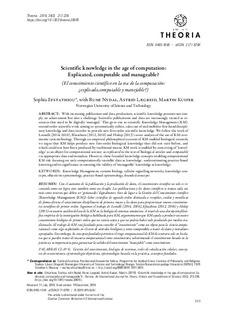| dc.contributor.author | Efstathiou, Sophia | |
| dc.contributor.author | Nydal, Rune | |
| dc.contributor.author | Lægreid, Astrid | |
| dc.contributor.author | Kuiper, Martin | |
| dc.date.accessioned | 2020-01-30T09:47:21Z | |
| dc.date.available | 2020-01-30T09:47:21Z | |
| dc.date.created | 2019-01-20T17:31:21Z | |
| dc.date.issued | 2019 | |
| dc.identifier.citation | Theoria. An international Journal of Theory, History and Foundations of Science. 2019, 34 (2), 213-236. | nb_NO |
| dc.identifier.issn | 0495-4548 | |
| dc.identifier.uri | http://hdl.handle.net/11250/2638813 | |
| dc.description.abstract | With increasing publication and data production, scientific knowledge stands not simply as an achievement but also as a challenge. Scientific publications and data are increasingly treated as resources that need to be digitally ‘managed.’ This gives rise to scientific Knowledge Management (KM): second-order scientific work aiming to systematically collect, take care of and mobilise first-hand disciplinary knowledge and data in order to provide new first-order scientific knowledge. We follow the work of Leonelli (2014, 2016), Efstathiou (2012, 2016) and Hislop (2013) in our analysis of the use of KM in semantic systems biology. Through an empirical philosophical account of KM-enabled biological research, we argue that KM helps produce new first-order biological knowledge that did not exist before, and which could not have been produced by traditional means. KM work is enabled by conceiving of ‘knowledge’ as an object for computational science: as explicated in the text of biological articles and computable via appropriate data and metadata. However, the founded concepts enabling computational KM risk focusing on only computationally tractable data as knowledge, underestimating practice-based knowing and its significance in ensuring the validity of ‘manageable’ knowledge as knowledge. | nb_NO |
| dc.language.iso | eng | nb_NO |
| dc.publisher | University of the Basque Country | nb_NO |
| dc.relation.uri | https://www.academia.edu/38184712/Scientific_knowledge_in_the_age_of_computation_THEORIA.pdf | |
| dc.rights | Navngivelse 4.0 Internasjonal | * |
| dc.rights.uri | http://creativecommons.org/licenses/by/4.0/deed.no | * |
| dc.subject | Systembiologi | nb_NO |
| dc.subject | Systems biology | nb_NO |
| dc.subject | Big Data | nb_NO |
| dc.subject | Knowledge management | nb_NO |
| dc.subject | Founded begreper | nb_NO |
| dc.subject | Founded concepts | nb_NO |
| dc.title | Scientific knowledge in the age of computation: Explicated, computable and manageable? | nb_NO |
| dc.type | Journal article | nb_NO |
| dc.type | Peer reviewed | nb_NO |
| dc.description.version | publishedVersion | nb_NO |
| dc.subject.nsi | VDP::Filosofi: 161 | nb_NO |
| dc.subject.nsi | VDP::Philosophy: 161 | nb_NO |
| dc.source.pagenumber | 213-236 | nb_NO |
| dc.source.volume | 34 | nb_NO |
| dc.source.journal | Theoria. An international Journal of Theory, History and Foundations of Science | nb_NO |
| dc.source.issue | 2 | nb_NO |
| dc.identifier.doi | 10.1387/theoria.20045 | |
| dc.identifier.cristin | 1661343 | |
| dc.relation.project | Norges forskningsråd: 03258/S10 | nb_NO |
| dc.description.localcode | This article is distributed under the terms of the Creative Commons Atribution 4.0 Internacional License | nb_NO |
| cristin.unitcode | 194,62,70,0 | |
| cristin.unitcode | 194,65,15,0 | |
| cristin.unitcode | 194,66,10,0 | |
| cristin.unitname | Institutt for filosofi og religionsvitenskap | |
| cristin.unitname | Institutt for klinisk og molekylær medisin | |
| cristin.unitname | Institutt for biologi | |
| cristin.ispublished | true | |
| cristin.fulltext | postprint | |
| cristin.qualitycode | 1 | |

